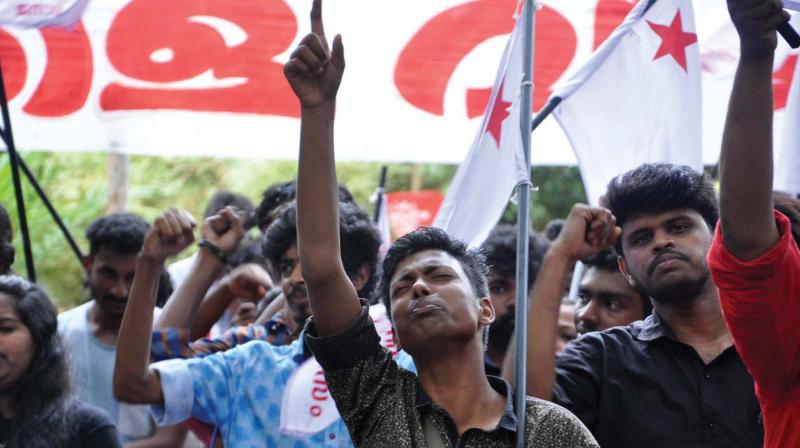Students decry Kerala High Court order

KOCHI: The Kerala High Court verdict putting a complete ban on strikes in educational institutions came as a shock to the student organisations. The strongly worded verdict by the division bench headed by the Chief Justice Navaniti Prasad Singh is expected to generate serious discussions amongst the community of legal experts, social scientists and political parties in the state and other parts of the country. Major political parties and students' organisations in the state have already expressed concern over the verdict. Senior Congress leader A.K. Antony called upon the state government to bring an appropriate legislation to facilitate student union activities in campuses while veteran CPM leader V. S, Achuthanandan has described the verdict as 'unfortunate'. Apart from the "discipline and punishment" paradigm, the verdict has also been placed under the critical scrutiny for its potential to campus as a sanitized space without any scope for critical discourses on what is happening in the society at large. The judgment, which quoted from Dr B.R. Ambedkar's last speech in the constituent assembly, has only mentioned about the stress he has placed about the need for adhering to Constitutional methods in achieving the demands. The speech has also mentioned two other issues with equal importance — equality and fraternity.
“We must begin by acknowledging the fact that there is a complete absence of two things in Indian Society. One of these is equality. On the social plane, we have in India a society based on the principle of graded inequality which we have a society in which there are some who have immense wealth as against many who live in abject poverty,” he said. The experience in the past 70 years of independence reveals that no much progress was achieved in this score. And the same goes for fraternity, hampered by the evil of caste. The student community, part of the organic component of the society at large, will reflect on these matters and which would have resonance in their behaviour and choice of political activity. As Adv Hareesh Vasudevan in a Facebook post has said, civil disobedience and other forms of agitation during the Independence struggle could have been in jeopardy if the disciplinarian notion prevailing in the present judgment.
J. Prabash, political scientist and former PVC of the Kerala University said that if politics is banned from campuses, it will create a void in the political space. "The political and social activity during the university or college life plays a major role in shaping the personality and character of an individual. Political awareness acquired during the campus life is a stepping stone to the next stage. If students unions based on political affiliation are prevented from functioning the space would be occupied by organisations based on religion or caste. We have experiences of such development. “We should also keep in the mind that student unions also work as a redressal mechanism for the grievances of students. Institutions like universities and colleges are not fully responsive to the students. It is true that student's politics should be more responsible. But it is not the problem with politics, other institutions like education institutions and judiciary should also be more accountable and responsive. Though I don't subscribe to the overreaction on the part of students in the name of agitation, we should give them the benefit of the doubt of their impressionistic age for the over-enthusiasm."
The SFI described the order as undemocratic and violation of the rights of the students. "The order of the court was anti-democratic as campus politics is the democratic right of the student. The importance of campus politics had been evident from the time of the freedom struggle. "Creative, cultural and intellectual activities formed the core of campus politics. It was the duty of the students to fight against injustice. Earlier also managements and authorities have tried to control campus politics. College unions formed as part of the political activity of students is a common platform to create awareness for students. This was because students unions have always questioned their wrong policies. Without student unions, drug mafia, fundamentalist forces, ragging gangs and anarchist tendencies would take the central stage."
Opposing the judgment, ABVP National Secretary O. Nidheesh said "I cannot agree to verdict saying that students should not conduct strikes in campuses. In a country where those above the age of 18 has voting rights, the very objective of the court verdict restricting politics on campuses, where those above the age of 18 study, is questionable. "Such verdicts will only result in turning campuses apolitical. It would only serve the interest of the management. The violence carried out by the SFI in the name of agitations to some extent has created a misunderstanding in the minds of the general public about campus politics", he said.
KSU President K.M. Abhijith said his outfit would approach the court against the new order. "The government should come out with a law to protect the rights of students' organisations that functioned responsibly on campuses. The government should show willpower in overcoming the situation. If political activities are curbed in the campuses, organisations with communal interest will grow on the campus with the help of management as most of the colleges are being run by community organizations. It would create insecurity among the student community. "In a country where those above 18 years of age can take part in the electoral process, it was strange that students are being restricted from politics. In a country where bar association, trade unions and teachers association are allowed to work freely why students are denied the freedom to organise," he asked.
(With inputs from Sabloo Thomas)

